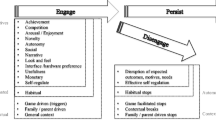Abstract
This study focuses on the role of gaming expectancies, motives and the experiences of gamers in the development of video game behavior, from normal to problematic behavior. Qualitative interviews were conducted among 21 male gamers between 17 and 28 years of age, to get more of an insight into their excessive gaming patterns. Participants were recruited in several ways such as by distributing flyers and posting messages on gaming websites. Participants were included if they were between 14 and 26 years of age and if they had experienced game related behavior problems at the time of the study or in the past. Two processes emerged from the results that seem to contribute to the transition to an excessive gaming pattern. First, the duration of each single game session may become longer. Second, a game session may be started up more and more frequently. Gamers have several motives and expectancies that play a role in this process of increasing gaming time. Is seems that a combination of these gaming motives can lead to an increase in gaming time. Especially online role playing games were related to excessive gaming and the social mechanisms in these games seem to work as an intensifier for other motives.
Similar content being viewed by others
References
American Psychiatric Association. (2000). Diagnostic and Statistical Manual of Mental Disorders (4th ed., rev.). Washington, DC: American Psychiatric Association.
Braun, V., & Clarke, V. (2006). Using thematic analysis in psychology. Qualitative Research in Psychology, 3, 77–101.
Caplan, S. (2010). Theory and measurement of generalized problematic Internet use: A two-step approach. Computers in Human Behavior, 26, 1089–1097.
Caplan, S., Williams, D., & Yee, N. (2009). Problematic Internet use and psychosocial well-being among MMO players. Computers in Human Behavior, 25, 1312–1319.
Gentile, D. (2009). Pathological video-game use among youth ages 8 to 18: A national study. Psychological Science, 20, 594–602.
Gentile, D., Choo, H., Liau, A., Sim, T., Li, D., Fung, D., & Khoo, A. (2011). Pathological video game use among youths: A two-year longitudinal study. Pediatrics, 127, 319–329.
Griffiths, M. (2000). Does Internet and computer “addiction” exist? Some case study evidence. Cyberpsychology & Behavior, 3, 211–218.
Haagsma, M. C., Pieterse, M. E., & Peters, O. (2012). The prevalence of problematic gamers in the Netherlands. Cyberpsychology, Behavior and Social Networking, 15, 162–168.
Hsu, S. H., Wen, M. H., & Wu, M. C. (2009). Exploring user experiences as predictors of MMORPG addiction. Computers in Education, 53, 990–999.
Hussain, Z., & Griffiths, M. D. (2009). The attitudes, feelings and experiences of online gamers: a qualitative analysis. Cyberpsychology & Behavior, 12, 747–753.
King, D., & Delfabbro, P. (2009a). Motivational differences in problem video game play. Journal of CyberTherapy and Rehabilitation, 2, 139–149.
King, D., & Delfabbro, P. (2009b). Understanding and assisting excessive players of video games: a community psychology perspective. The Australian Community Psychologist, 21, 62–74.
King, D., Delfabbro, P., & Griffiths, M. (2010). Recent innovations in video game addiction research and theory. Global Media Journal-Australian Edition, 4, 1–13.
Kuss, D. J., & Griffiths, M. D. (2012). Internet gaming addiction: a systematic review of empirical research. International Journal of Mental Health and Addiction, 10, 278–296.
LaRose, R., Lin, C. A., & Eastin, M. S. (2003). Unregulated Internet usage: Addiction, habit, or deficient self-regulation? Media Psychology, 5, 225–253.
Lee, D., & LaRose, R. (2007). A socio-cognitive model of video game usage. Journal of Broadcasting & Electronic Media, 51, 632–650.
Lemmens, J. S., Valkenburg, P. M., & Peter, J. (2009). Development and validation of a game addiction scale for adolescents. Media Psychology, 12, 77–95.
Lemmens, J. S., Valkenburg, P. M., & Peter, J. (2011). Psychosocial causes and consequences of pathological gaming. Computers in Human Behavior, 27, 144–152.
Mentzoni, R. A., Brunborg, G. S., Molde, H., Myrseth, H., Skouveroe, K. J. M., Hetland, J., & Pallesen, S. (2011). Problematic video game use: Estimated prevalence and associations with mental and physical health. Cyberpsychology, Behavior and Social Networking, 14, 591–596.
Ng, B. D., & Wiemer-Hastings, P. (2005). Addiction to the internet and online gaming. Cyberpsychology & Behavior, 8, 110–113.
Rehbein, F., Kleimann, M., & Mößle, T. (2010). Prevalence and risk factors of video game dependency in adolescence: Results of a German nationwide survey. Cyberpsychology, Behavior and Social Networking, 13, 269–277.
Tsai, C. C., & Lin, S. S. J. (2003). Internet addiction of adolescents in Taiwan: An interview study. Cyberpsychology & Behavior, 6, 649–652.
Van Rooij, A. J., Schoenmakers, T. M., Vermulst, A. A., Van den Eijnden, R. J. J. M., & Van de Mheen, D. (2011). Online video game addiction: Identification of addicted adolescent gamers. Addiction, 106, 205–212.
Wan, C. S., & Chiou, W. B. (2006). Why are adolescents addicted to online gaming? An interview study in Taiwan. Cyberpsychology & Behavior, 9, 762–766.
Wechsler, H., & Nelson, T. F. (2001). Binge drinking and the American college students: What's five drinks? Psychology of Addictive Behaviors, 15, 287–291.
World Health Organization. (1992). The ICD-10 classification of mental and behavioural disorders. Clinical descriptions and diagnostic guidelines. Geneva: World Health Organization.
Yee, N. (2006). Motivations for play in online games. Cyberpsychology & Behavior, 9, 772–775.
Author information
Authors and Affiliations
Corresponding author
Rights and permissions
About this article
Cite this article
Haagsma, M.C., Pieterse, M.E., Peters, O. et al. How Gaming May Become a Problem: A Qualitative Analysis of the Role of Gaming Related Experiences and Cognitions in the Development of Problematic Game Behavior. Int J Ment Health Addiction 11, 441–452 (2013). https://doi.org/10.1007/s11469-013-9427-4
Published:
Issue Date:
DOI: https://doi.org/10.1007/s11469-013-9427-4




